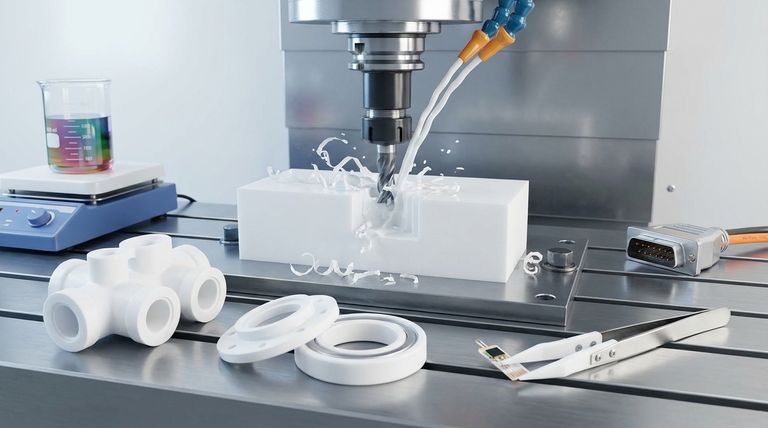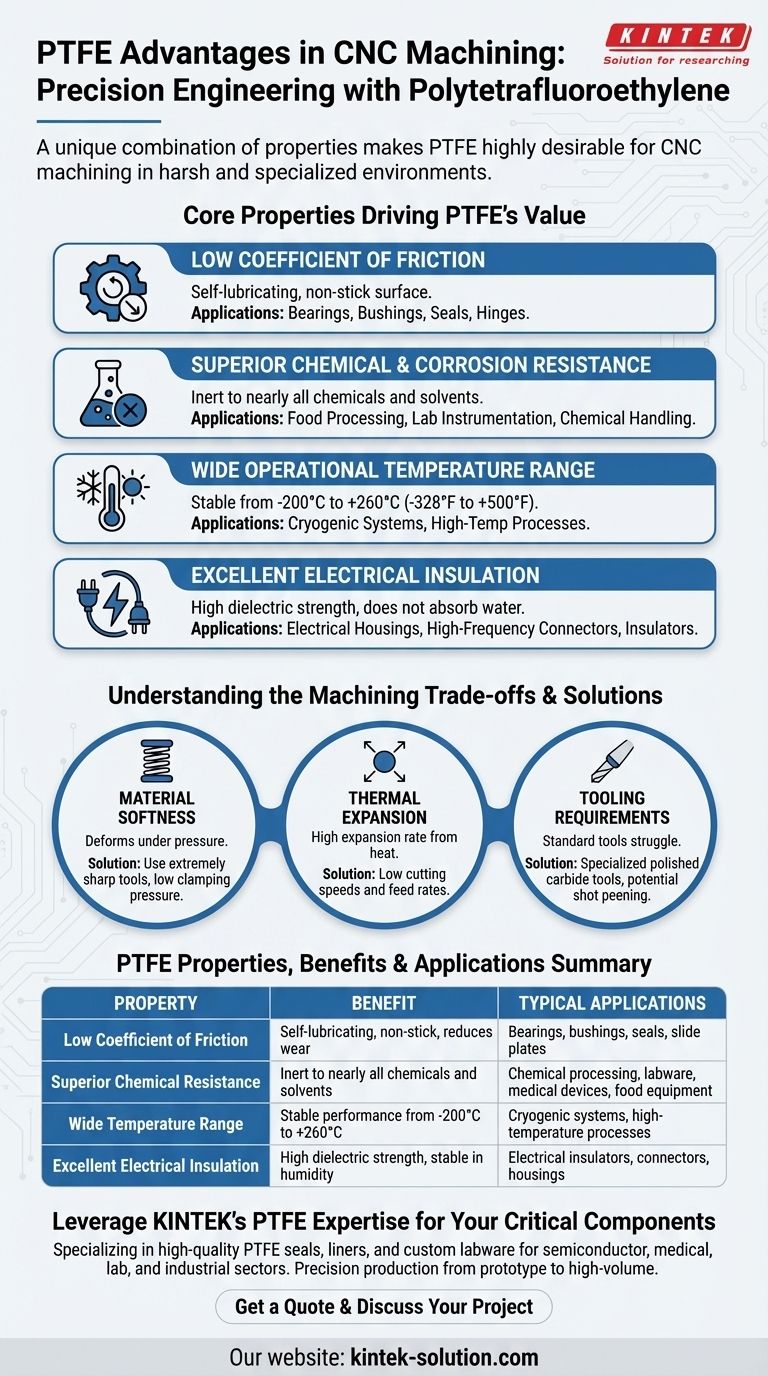As an engineering plastic, Polytetrafluoroethylene (PTFE) offers a unique combination of properties that make it highly desirable for CNC machining. Its primary advantages stem from its excellent chemical resistance, high-temperature stability, exceptionally low coefficient of friction, and superior electrical insulation. These characteristics make it a go-to material for precise components intended for harsh or specialized operating environments.
PTFE's value lies not in its strength, but in its extreme inertness and lubricity. While its softness presents distinct machining challenges, its unparalleled resistance to chemicals, heat, and electricity makes it indispensable for components where other materials would quickly fail.

The Core Properties Driving PTFE's Value
The decision to use PTFE is almost always driven by its performance in extreme conditions. Understanding its core attributes is key to leveraging it effectively.
Exceptionally Low Coefficient of Friction
PTFE has one of the lowest coefficients of friction of any solid material, often compared to wet ice on wet ice. This results in a self-lubricating, non-stick surface.
This property is critical for applications like bearings, bushings, seals, and hinges, where reducing wear and eliminating the need for external lubricants is essential.
Superior Chemical and Corrosion Resistance
PTFE is chemically inert and non-reactive to nearly all known chemicals and solvents. This makes it an ideal choice for components that will be exposed to corrosive substances.
You will find it used extensively in food processing equipment, laboratory instrumentation, and chemical handling systems where purity and resistance to degradation are paramount.
Wide Operational Temperature Range
This material maintains its properties across an impressively wide temperature spectrum, typically from -200°C to +260°C (-328°F to +500°F).
This thermal stability ensures that machined parts perform reliably in applications involving cryogenic fluids or high-temperature processes without becoming brittle or deforming.
Excellent Electrical Insulation
PTFE is a superb electrical insulator with high dielectric strength. It does not absorb water, ensuring its insulating properties remain stable even in humid environments.
This makes it a first-choice material for electrical housings, high-frequency connectors, and insulators in the aerospace and automotive industries.
Understanding the Machining Trade-offs
While PTFE's properties are highly advantageous, its inherent softness creates specific challenges during CNC machining that must be managed to achieve precision.
Material Softness and Deformation
PTFE is a soft material that can easily deform or compress under pressure. This demands the use of extremely sharp cutting tools to shear the material cleanly rather than pushing it.
Furthermore, low clamping pressure is crucial. Over-tightening the workpiece in the CNC machine will cause it to distort, leading to inaccurate final dimensions.
Managing Thermal Expansion
The material has a high rate of thermal expansion. Heat generated during cutting can cause the part to expand, compromising tight tolerances.
To mitigate this, machinists must use low cutting speeds and feed rates. This minimizes heat buildup and ensures dimensional stability throughout the process.
Tooling and Finishing Requirements
Standard tools can struggle with PTFE's softness. The best results are achieved with specialized tooling, such as carbide tools with highly polished surfaces, which reduce friction and material buildup.
For certain applications requiring a specific surface texture, post-processing techniques like shot peening may be implemented to achieve the desired finish.
Making the Right Choice for Your Application
Choosing PTFE is a strategic decision based on the operational demands of the final component. Your primary goal will dictate if its benefits outweigh its machining complexities.
- If your primary focus is low friction and wear resistance: PTFE is an ideal choice for self-lubricating parts like bearings, slide plates, and seals.
- If your primary focus is chemical inertness: Select PTFE for components in food processing, medical devices, or lab equipment that must resist corrosive substances.
- If your primary focus is electrical insulation: Use PTFE for high-performance insulators, connectors, and housings where dielectric strength is critical.
- If your primary focus is thermal stability: Consider PTFE for parts that must function reliably across a vast range of extreme temperatures, from cryogenic to high heat.
By understanding both its unique benefits and its specific machining requirements, you can effectively leverage PTFE for your most demanding engineering challenges.
Summary Table:
| Property | Benefit | Typical Applications |
|---|---|---|
| Low Coefficient of Friction | Self-lubricating, non-stick, reduces wear | Bearings, bushings, seals, slide plates |
| Superior Chemical Resistance | Inert to nearly all chemicals and solvents | Chemical processing, labware, medical devices, food equipment |
| Wide Temperature Range | Stable performance from -200°C to +260°C | Cryogenic systems, high-temperature processes |
| Excellent Electrical Insulation | High dielectric strength, stable in humidity | Electrical insulators, connectors, housings |
Leverage KINTEK's PTFE Expertise for Your Critical Components
Do you require precision-machined parts that can withstand corrosive chemicals, extreme temperatures, or demanding electrical applications? KINTEK specializes in manufacturing high-quality PTFE components—including seals, liners, and custom labware—for the semiconductor, medical, laboratory, and industrial sectors.
We understand the unique challenges of machining PTFE and prioritize precision production to ensure your parts meet the highest standards of performance and reliability. From initial prototypes to high-volume production runs, we provide custom fabrication solutions tailored to your specific needs.
Contact us today to discuss your project and discover how our PTFE expertise can provide the durable, high-performance solution you need.
Get a Quote & Discuss Your Project
Visual Guide

Related Products
- Custom PTFE Parts Manufacturer for Teflon Parts and PTFE Tweezers
- Custom PTFE Parts Manufacturer for Teflon Containers and Components
- Custom PTFE Teflon Balls for Advanced Industrial Applications
- Custom PTFE Sleeves and Hollow Rods for Advanced Applications
- Custom PTFE Measuring Cylinders for Advanced Scientific and Industrial Applications
People Also Ask
- What are the unique properties of PTFE? The 3 Pillars Driving Demand for High-Performance Parts
- What industrial benefits do PTFE-machined parts offer? Achieve Peak Performance in Demanding Applications
- What finishing techniques are effective for machined Teflon parts? Achieve Functional Performance and Dimensional Stability
- What factors should be considered when choosing between Nylon and PTFE? Select the Right Material for Your Application
- What fabrication services are available for PTFE? Shearing, Stamping, Laser Cutting, Molding & Machining



















